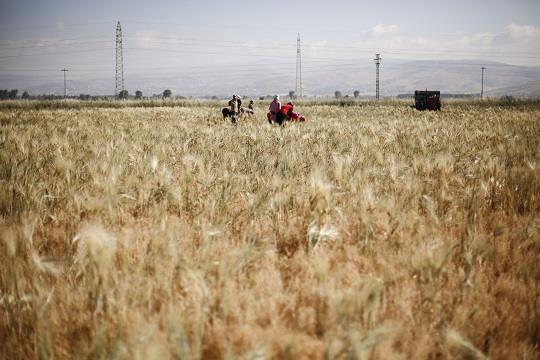FAO reveals value chain studies results to improve milk, wheat and tomato production in Syria

Wheat harvesting in Syria.
7 August 2018, Damascus, Syria- The Food and Agriculture Organization of the United Nations (FAO) has organized a workshop to present the results of studies conducted on the value chains of tomato, dairy products and barley/wheat in Syria, under European Union funding.
The workshop, held on 6 August 2018, was attended by the Ministry of Agriculture and Agrarian Reform (MAAR) and all its relevant directorates as well as the Planning International Cooperation Commission (PICC) and other stakeholders
The workshop confirmed the findings of the studies, including the constraints and opportunities for the value chains, as well as delineating a way forward for the various actors involved. The studies drew on both original research and secondary data from previous MAAR analyses.
“Supporting the agriculture sector in Syria to become more resilient against all hazards is critical after years of conflict. Syria was an exporter of food products and raw materials prior to the crisis. FAO and its counterparts involved in the agriculture sector will join efforts to reposition Syria as a strong agricultural country again,” said Mike Robson, FAO Representative in Syria.
All the commodities reviewed in the workshop experienced similar constraints at a certain level – particularly low productivity and low competiveness, when compared to other countries.
The studies identified various challenges faced by the value chains, such as low quality and high prices of inputs, shortages of skilled labor, and reduced access to credit and training. Other challenges include inadequate quality control and post-production facilities, such as post-harvest mechanisms, and scarce availability of and unsustainable use of natural resources (water and land).
Eight years of crisis have exacerbated all these challenges, in addition to creating market distortions, transportation issues and increasing farmer exposure to asymmetric information (regarding markets, prices, etc).
The workshop highlighted as well the importance of competiveness and value addition, putting forward the question of why Syrian commodities are not well enough placed to compete on regional/international markets.
While the event clarified that the objective of the studies was not only to facilitate export, it emerged clearly from the discussions that import substitution was a key policy objective. However, the country will continue to import from foreign countries, should it be more cost-effective to do so.
The workshop emphasized the need to exercise efforts to make the local market more competitive, by improving quality control, restoring collaboration with research centers to preserve genetic resources ensuring availability of best and locally-adapted varieties, rehabilitating water infrastructure facilities, and adopting sustainable agriculture practices (including animal health and animal feeding).
The event was an opportunity to enrich the quality of the studies, and to agree on the range of possible options including actors best placed to intervene, in order to ensure the Syrian agriculture sector is able to restore its full capacity. The complete and detailed studies will be distributed to all participants, and will be publicized once completed.
